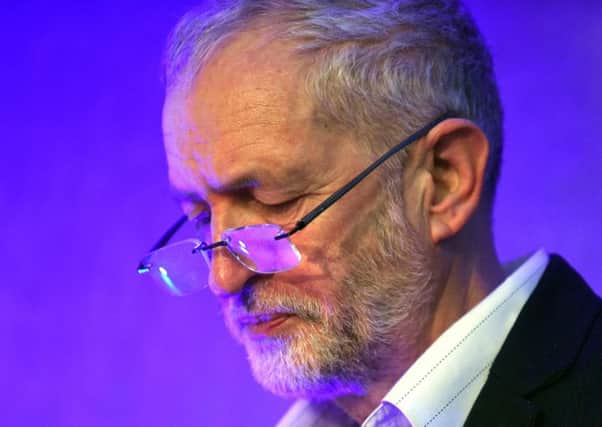Leaders: Labour's Opposition role is crippled by feuding


Hopes that the Labour leadership contest might move on to debate new ideas and policies are sinking fast in the light of the latest bitter exchanges. The party has descended even deeper towards a fundamental split between Jeremy Corbyn and challenger Owen Smith.
To say that the contest has descended into a war of words underplays the depth of the division within the party, not just over its leadership but also over its future as a party. While Mr Smith’s supporters have claimed the Labour leader is shying away from public debates, Mr Corbyn has called for the party’s MPs to “think again” after reports that some are planning a “semi-split” of the party – a group of senior Labour MPs is said to be looking at plans to set up an “alternative Labour” if Mr Corbyn stays on as leader.
Advertisement
Hide AdAdvertisement
Hide AdMr Smith says Labour is now “on the edge of the precipice”. He said last week that he feared a split within Labour along national lines, with parties in Scotland and Wales going it alone faced with continued leadership by Mr Corbyn in London. Reports yesterday quoted party sources saying Scottish Labour could still opt to break away if Mr Corbyn wins the leadership challenge.
Mr Corbyn says the party should unite to fight the Tories. But MPs are focused on the raging internal battle between two fundamentally opposed camps and it is hard to see how the parliamentary party can unite should Mr Corbyn win the leadership contest. Equally, many rank and file party members may refuse to accept what they see as a coup against the leader and will fight to retain the party title, offices, finance and organisation.
That all this is taking place just when an effective and articulate Opposition is needed to hold the UK Government to account as it prepares for the complexities of exit from the European Union almost beggars belief.
Meanwhile, major multi-billion-pound projects such as the new Hinkley C nuclear power station are in a state of total confusion. Within Labour itself there is deep division as to whether this controversial nuclear project should go ahead at all.
The rancorous Labour leadership race is almost totally inward-looking, with critics of Mr Smith calling on him to condemn suggestions the party could split if Mr Corbyn – the frontrunner – wins the leadership ballot. Mr Smith’s campaign hit back, citing previous statements from deputy leader John McDonnell on Labour that “if it’s no longer a useful vehicle, move on”.
Scottish leader Kezia Dugdale has already given her backing to rebel MPs calling on their leader to stand down. Meanwhile, the Smith campaign accused Mr Corbyn of ducking out of debates after reports an event hosted by Channel 4 will not go ahead after the leader declined to take part.
In this rancid atmosphere, any prospect of hearing the contenders debate their ideas for the future seems remote.
Our favourite novels? Prepare to duck
Looking for a behind-the-scenes thriller about how a simple idea can lead to furious rows and
Advertisement
Hide AdAdvertisement
Hide Admurderous exchanges? Look no further than BBC Scotland’s contest to find the nation’s favourite novels.
A heartwarmingly innocent venture, you may think, and one with the most noble intent – to encourage greater reading. What could possibly go wrong? But as those who have embarked on similar enterprises can testify, stand by for fireworks.
Readers are asked to choose their top ten from a list of 30 contenders selected by an “expert panel”, comprising a range of contemporary and classic favourites. Well, who’s done the selection of this chosen 30? And what are the criteria they have used for the shortlist?
The organisers say people can champion books not on the list through social media, such as Twitter. Using Twitter to promote reading? Literary academics will groan
loudly – and will certainly not confine themselves to 140 characters.
Eligible authors “must have been born or based in Scotland”. Well, what does “based” mean, exactly? Resident here for tax purposes, or just passing through? And what of great Scots writers who may have been born outwith Scotland?
The list includes Scotland’s most famous authors, from Sir Walter Scott and Jessie
Kesson to John Buchan and Muriel Spark.
Living writers include Ian Rankin, AL Kennedy, JK Rowling and Irvine Welsh. But what of the great Gaelic writers? Will books in Gaelic get a look-in? Or books by Scots written in other languages? Or books that may not be politically “appropriate” or “correct”?
Advertisement
Hide AdAdvertisement
Hide AdChoosing our favourite writers may be considered a gentle pastime for bookworms. But when it comes to choosing our “favourite authors” bookworms can turn nasty and devour more than books. How brave, BBC Scotland. How very brave!